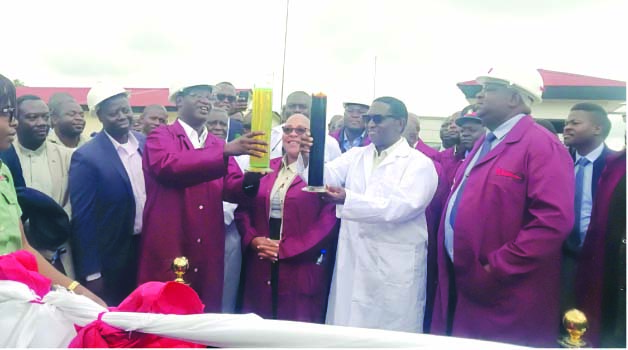THE use of pipelines and their associated infrastructure is key in maintaining a stable fuel sub-sector in any economy.
Not only that, the use of the pipeline helps to boost security for the country’s fuel needs in an event of an interruption through such things as the closure of borders like what happened in the recent past when COVID-19 broke out.
Compared to inland transportation, the use of the pipeline in fuel haulage is believed to be cheaper than using road or railway transportation because of the associated cost benefits.
Pipelines are also believed to be more climate-smart with high environmental benefit and no harmful substance emissions compared to other transport mechanisms.
In Zambia’s scenario, the transportation of the finished petroleum products has been through road transport which boomed the fuel tanker business in the country and created jobs for youths.
Zambia currently imports 100 per cent of its entire fuel requirement which include diesel, petrol, kerosene, JET A-1 and Liquid Petroleum Gas (LPG).
The fuel industry in Zambia makes up between 4.6 and 6.5 per cent of the global economy.
It contributes to the Gross Domestic Product (GDP) growth and has created employment and business opportunities for the local people in supply, transportation and retailing of the commodity.
The country currently consumes 150 million litres of fuel per month with diesel topping in demand with its consumption standing at 100 million litres with petrol at 35 million litres and the remaining is for kerosene and aviation fuel.
The demand for diesel has been high because it is used in large quantities by mines and industries, and because of this, the price has been high.
To reduce its cost to help drop the cost of production, given its use in that sector, the government has decided to use the pipeline to transport the commodity.
For this reason, the government has converted the Tazama pipeline from transporting crude oil to finished fuel products to help reduce the price of the commodity on the local market.
The conversion of the pipeline from crude oil to finished products was at the cost of $500,000 and was commissioned last month.
The conversion of the Tazama pipeline will significantly reduce the transportation cost of low sulphur diesel to $121 per tonne from the current $170.
Energy minister Peter Kapala says the conversion of the pipeline is expected to have a significant impact on the pump price for low sulphur diesel in the country.
He says the use of the pipeline to transport low sulphur diesel will also reduce the pressure on roads and result in improved road safety and savings in road maintenance costs.
“With this completion of the conversion of the pipeline, allow me to
take this opportunity to announce that Oil Marketing Companies (OMC) are invited to use the pipeline to bring in their low sulphur diesel.
“My ministry is already working with Tazama on modalities to ensure transparency and fairness in the allocation of pipeline capacity for the transportation of low sulphur diesel,” he says.

Copperbelt minister Elisha Matambo and other senior government and private sector officials the finished lowsulphur diesel transported through the pipeline after its conversion from crude oil to finished products recently.
Picture by CHATULA KANGALI.
Mr Kapala has urged OMCs to utilise the pipeline to transport low sulphur diesel.
Tazama managing director Davison Thawethe adds that the conversion has improved the capacity of the pipeline from 600,000 tonnes to 800,000 tonnes.
Mr Thawethe says to enhance surveillance around the pipeline from Tanzania to Zambia, the company has procured a drone.
He explains that the drone will monitor activities around the 1,710 kilometre pipeline and that it will be operated by Tazama management both in Zambia and Tanzania.
“This drone will help to monitor any activities that will take place around the pipeline. What is coming in now is a finished product and unscrupulous people can be attracted to decant and steal fuel and vandalise the infrastructure,” he says
Mr Thawethe says the company has intensified security around the pipeline and sensitised the residents in the area.
Tazama has further partnered with traditional leaders and people around the area to enhance security.
Mr Thawethe adds that the company will continue sensitising people living around the pipeline on the importance of safeguarding the infrastructure.
Energy Regulation Board (ERB) board chairperson Raynolds Bowa says the transportation of fuel through the pipeline will have an impact on the reduction of fuel.
Oil Marketing Companies Association of Zambia President Kafula
Mubanga observes that the utilisation of the pipeline has proven to help in the reduction of prices of fuel.
Dr Mubanga says the benefits for utilising the pipeline can be seen through the recent evidence reductions in pump price of diesel.
He says as the migration from road transport to pipeline continues, the country will witness more benefits in terms of price reduction.
“The benefits of using the pipeline are quite immense and beneficial to everyone just as it was witnessed last month for the price of diesel. The pipeline is handy and cheaper compared to road transport,” he states.
Dr Mubanga says the price of oil and transportation cost is the major component that constitutes the final pump price.
He says with the use of the pipeline, the government has control over the rate of transportation compared to the road transportation sector which is in private
hands.
Dr Mubanga calls for the full utilisation of the pipeline to help in the reduction of the pump price
He further calls for the extension of the pipeline to the neighbouring
Democratic Republic of Congo (DRC) to cater the market.
Dr Mubanga notes that a number of companies have applied to utilise the pipeline as the government opens it to the private sector.
With more volumes of fuel expected to be transported through the pipeline, it is hopeful that the cost of transporting fuel will reduce, thereby reducing the cost of the pump price.
The reduction of fuel prices will then reduce the cost of doing business which, it is hoped, will have a trickledown effect to consumers and general economy.







